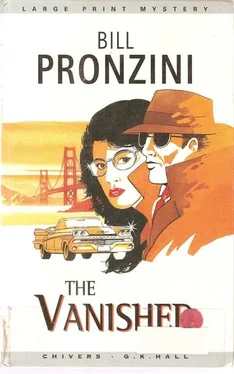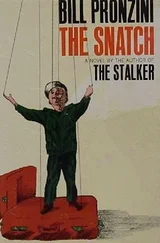Bill Pronzini - The Vanished
Здесь есть возможность читать онлайн «Bill Pronzini - The Vanished» весь текст электронной книги совершенно бесплатно (целиком полную версию без сокращений). В некоторых случаях можно слушать аудио, скачать через торрент в формате fb2 и присутствует краткое содержание. Жанр: Детектив, на английском языке. Описание произведения, (предисловие) а так же отзывы посетителей доступны на портале библиотеки ЛибКат.
- Название:The Vanished
- Автор:
- Жанр:
- Год:неизвестен
- ISBN:нет данных
- Рейтинг книги:3 / 5. Голосов: 1
-
Избранное:Добавить в избранное
- Отзывы:
-
Ваша оценка:
- 60
- 1
- 2
- 3
- 4
- 5
The Vanished: краткое содержание, описание и аннотация
Предлагаем к чтению аннотацию, описание, краткое содержание или предисловие (зависит от того, что написал сам автор книги «The Vanished»). Если вы не нашли необходимую информацию о книге — напишите в комментариях, мы постараемся отыскать её.
The Vanished — читать онлайн бесплатно полную книгу (весь текст) целиком
Ниже представлен текст книги, разбитый по страницам. Система сохранения места последней прочитанной страницы, позволяет с удобством читать онлайн бесплатно книгу «The Vanished», без необходимости каждый раз заново искать на чём Вы остановились. Поставьте закладку, и сможете в любой момент перейти на страницу, на которой закончили чтение.
Интервал:
Закладка:
‘If I find out anything that might interest you on this matter, I’ll let you know.’
‘That would be very kind.’
‘Auf Wiedersehen, Herr Hüssner.’
‘Alles Gute, meine Freunde.’
The cold sweetness of the rain outside was like an oxygen resuscitator to a man dying of cyanide-gas poisoning…
At the Bayerischer Hof, I asked the desk man to confirm a reservation for me on the earliest flight from Frankfurt to London the next day, and to get me onto the first polar flight to San Francisco following my arrival at Heathrow. Then I wrote out a brief telegram to Elaine Kavanaugh, telling her I was leaving Germany and that I would come to see her as soon as I arrived back in San Francisco. That would have to do in place of my promised telephone call.
It could be, I knew, that my decision to leave was premature, but I had to make a choice and my instincts had called for this one from the moment I had left Herr Hüssner’s office. I could spend another couple of days in Kitzingen, but it seemed pointless in view of what I had learned-the implications, the direction, of what I had learned. I fully intended to use the remainder of this day in trying to uncover further information on Sands, on the portrait; I had the feeling, however, that I had already found out most, if not all, of what there was to be found in Germany.
I went up to my room and sat drinking hot coffee, letting my mind work over what I now had. I got it into an orderly progression after a time, and it went like this:
Roy Sands is not so much different from his circle of friends as it had first appeared; like MacVeagh and the others, he is an aging lover, a cocksman who needs the reassurance of his desirability and his manhood-and even though he’s in love with Elaine Kavanaugh, and plans to marry her, he happens to be in Germany and she happens to be in the States. A hard-on having no conscience, as they say, he goes prowling and he meets pretty, young, emotional Diane Emery. They have a thing- maybe casual for both in the beginning, maybe immediately deeper than a shallow physical relationship for the girl.
For one reason or another-Sands’ reticent nature is such that his ego does not require the verbal feeding of one such as MacVeagh’s, or he is afraid of word leaking back to Elaine-he keeps his affair with Diane strictly to himself. But in a weak moment he allows her to make a sketch of him, which she then presents to him as a token of her love or esteem or whatever. He cannot bring himself to destroy the sketch, and so he puts it in with the things he is shipping back to Elaine, knowing that under normal circumstances she won’t pry.
Aside from the sketch, Sands is very careful. He meets Diane only in Kitzingen, perhaps at her apartment, perhaps at a café or restaurant-and perhaps at the Galerie der Expressionisten. She frequents the establishment, since her paintings are on exhibit there, and so on some occasion she gives him the name and address and he writes it down and if he rendezvouses with her there, it is outside somewhere; Herr Ackermann never sees him.
The affair progresses, with dozens of possible nuances unexplainable just now-and then the girl becomes pregnant. Sands’ interest in her has apparently been little more than the scratching of an itch, but it has become far more than that for Diane; she’s fallen in love with him. Maybe she asks him to marry her, but even if he wanted to do the right thing by her, he is unable to; he’s in love with Elaine, and the choice between the two of them is no contest. He tells Diane that he can’t marry her, perhaps offering to pay for an adoption or an abortion.
But the girl does not take his rejection of her love and her love-child in the worldly manner in which he expects. She is an earthlover, hands clasped to and from the grave, and life on any other terms is unthinkable for her; the rejection is absolute. So on one fine Saturday she makes her decision and she ties a length of clothesline around a light fixture and around her throat and destroys herself and her baby in a single strangling, suspended danse macabre.
Sands, on that same day, has some kind of appointment with the girl and he goes to her studio; there he discovers what has happened-one of the neighbors tells him, maybe, or he sees the Polizei removing her body. He is horrified, shocked, grieved; whatever else Sands may be, he is also a man with feelings, with a conscience. He blames himself for the girl’s death, and the guilt is too much for him to bear. He goes to the cheapest Kneipe in the city-the Dodge City Bar-and he asks Sybille, ‘Why did it have to happen?’, and then he drinks himself into a three-day stupor.
When MacVeagh locates him on the following Monday, and sobers him up, Sands has lost some of the deep, unbearable guilt. He still feels responsible for what happened, but it is done and finished now, and torturing himself will not bring Diane back. So he comes out of it, more reticent than ever, and until he is returned to the States for discharge he stays close to home, filling his days and his nights with visions of Elaine…
Well, I thought, okay. It all fits, and that’s fine. But there are still too many unanswered questions. Like: How does all of this fit in with Sands’ disappearance? And why is that portrait important to the person in San Francisco who made those threatening telephone calls to Elaine and me? And why does that person want Sands’ affair with Diane Emery to remain a buried secret-if, in fact, that was the reason or part of the reason he tried to keep me out of Germany?
Since the entire episode with Diane Emery-assuming, of course, that the connection between the two existed in reality and not only inside my head-took place in Germany, there conceivably could be no connection between the vanishing of Sands and the affair. If it were not for that portrait and its as yet unexplained importance, which made for a strong link between the two. And if it were not for one other nagging little fact that formed a nebulous but potentially important connection.
Diane Emery’s parents lived in Roxbury, California, near the city of Eureka-and Eureka was in the northern part of the state, approximately halfway between San Francisco and Eugene, Oregon, the two places where Sands had last been seen.
I got out of my chair and paced awhile, remembering what Chuck Hendryx had told me about his brief meeting with Sands at the Presidio in San Francisco. Well, suppose the something Sands had said he had to do before meeting Elaine was to see the parents of the girl whose death he had indirectly caused- either because the guilt was still strong in him and confession was a balm for an aching soul, or for some other intangible reason. If so, had he gone to Roxbury? Or had something detoured him to Eugene first? And if he had stopped in Roxbury, was the key to his eventual disappearance to be found there?
I stopped pacing and sat down again, and the telephone bell sounded. It was the desk man to tell me that there was a flight leaving Frankfurt at eight-thirty in the morning, and a polar non-stop departing London at one tomorrow afternoon; I was confirmed on both flights. I thanked him and put the receiver down and got my suitcase out of the closet.
After I had packed, I went downstairs and out into the rain again, to see if there was anything more to be unearthed. When I came back six hours later-having spoken to Diane Emery’s neighbors, to a couple of casual acquaintances of Roy Sands at Larson Barracks, to the proprietor of another, smaller art gallery-I had to answer to that: there was nothing.
I told myself once more that I was making the right decision in leaving, picked up my suitcase and my car from the Bayerischer Hof, and began the trip back to Frankfurt and home.
Читать дальшеИнтервал:
Закладка:
Похожие книги на «The Vanished»
Представляем Вашему вниманию похожие книги на «The Vanished» списком для выбора. Мы отобрали схожую по названию и смыслу литературу в надежде предоставить читателям больше вариантов отыскать новые, интересные, ещё непрочитанные произведения.
Обсуждение, отзывы о книге «The Vanished» и просто собственные мнения читателей. Оставьте ваши комментарии, напишите, что Вы думаете о произведении, его смысле или главных героях. Укажите что конкретно понравилось, а что нет, и почему Вы так считаете.












